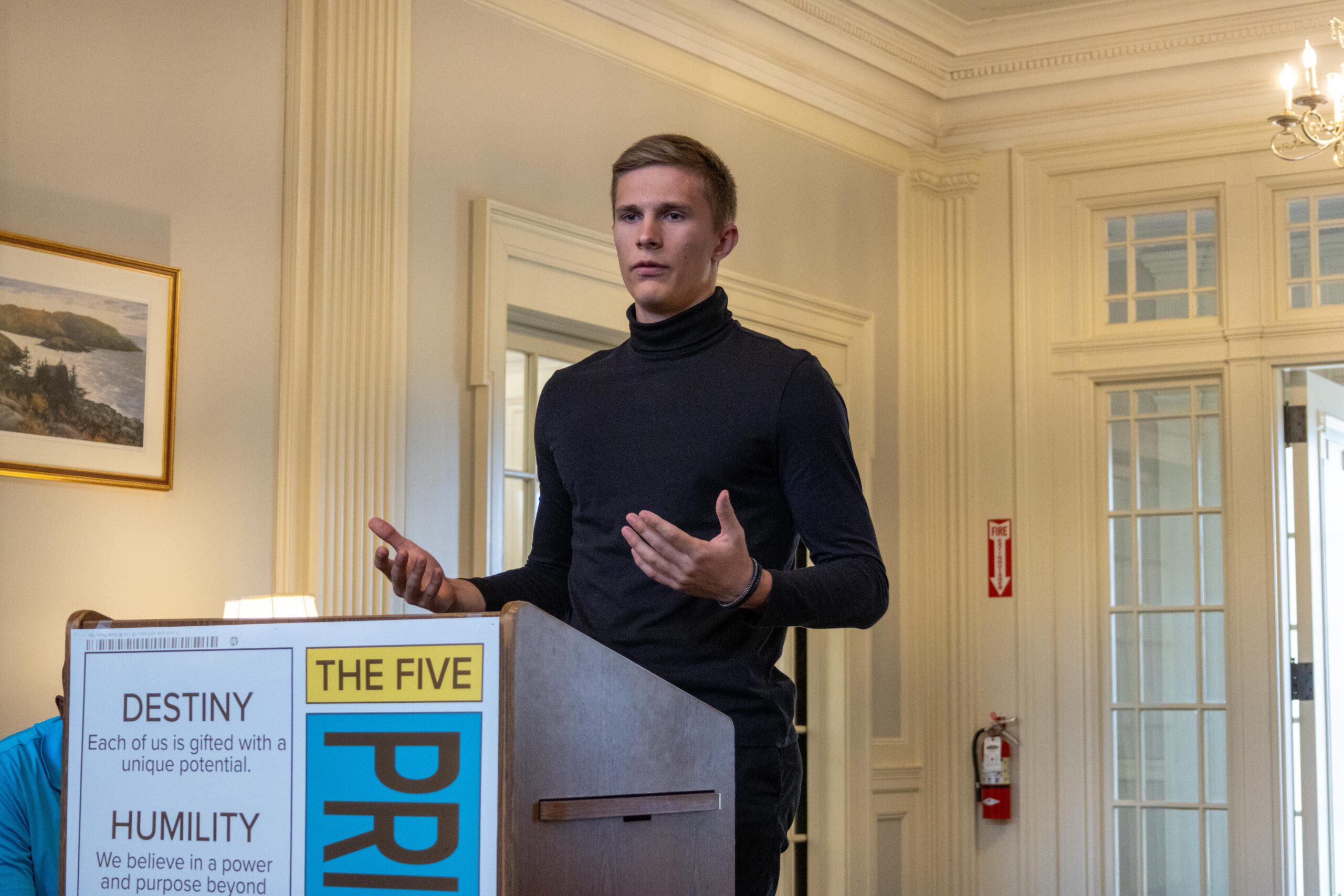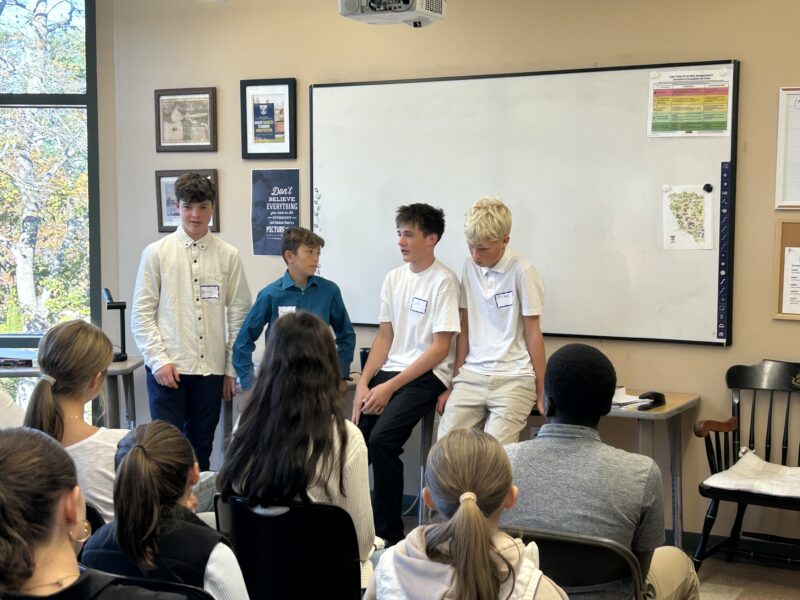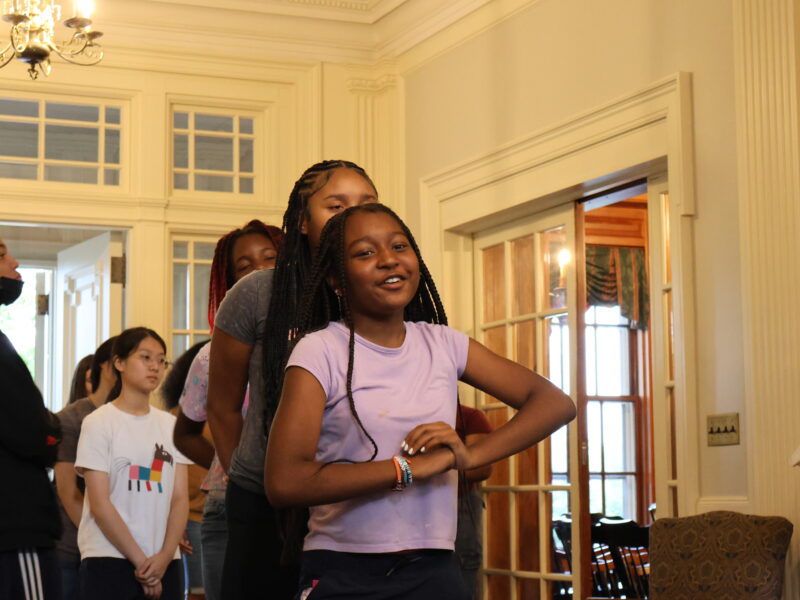
If you know anything about the Discovery Process, you know that it’s all about putting culture first.
And great cultures tend to have three ingredients perpetually interacting with each other: #1) A shared reason for being; #2) a shared common language; #3) a set of practices and traditions that support and amplify #1 and #2.
When it comes to common language, the Discovery Process is rooted in the 5 Words that were established when Hyde School was founded in 1966 and…

… the 5 Principles that were adopted via a community-wide initiative in the early 1990s.

Of the 134 lessons comprising the Discovery Process on-line learning portal, 48 focus directly on one (or more) of those 10 Words and Principles. However, when it comes to truly internalizing them, nothing beats faculty and students just talking about them… a lot. (In fact, I would submit that it’s impossible to overdo it!)
At our school, we have a weekly all-school meeting on Thursday afternoon that clocks in at less than an hour. Being on campus, I decided to sit in on this week’s meeting which happened to be focused on the 5 Principles. To set the meeting up, earlier in the week, students and faculty were asked via group email if they would like to share something — a story, an observation, a realization — for a few minutes on one of the Principles. The plan was to have one student and one teacher per Principle.

Destiny – The meeting kicked off with an alumna faculty member talking about how she always thought she wanted to be a lawyer. After attending a prestigious law school and taking a job in a big urban firm — She observed, “If you’ve seen the TV series Suits, you have a pretty good idea what it was like.” — she realized that she felt bored and unhappy. In the middle of all this, she learned that she had cancer. She explained that her mood combined with her illness caused her to reevaluate her life’s purpose. This led her into the teaching life. She observed, “Although we tend to dislike curve balls when they’re thrown at us, sometimes they can help us by compelling us toward a better life.”….. Then came the student, a young man from Europe who is working hard to improve his English. He chose to test himself in front of the whole school. He described Destiny as something “big to live up to with no regrets.” He noted his personal strategy of setting and pursuing both small and big goals simultaneously helps keep him on track by helping to ensure victories — both big and small — along the way.
Humility – A female student spoke of her anguish over losing a close friend: “The spark in my life was gone.” She went on to say how this experience led her to ask for help from others which, in turn, taught her that this was a strength, not weakness….. The faculty member spoke of how faith informs humility in his life. He concluded with a quote from St. Augustine: “Humility is the foundation of all the other virtues.”

Conscience – A faculty member told a story from her teen years when her efforts to help a friend who was feeling unappreciated at his summer job led her to steal an “Employee of the Month” sign from another business establishment and then give it to him to cheer him up. However, after feeling overcome with guilt, she put the sign back where she found it….. The student spoke of experiences with peers who were acting inappropriately towards others in a community park and later at a grocery store. He explained how he wrestled with his conscience concerning his own role — and lack thereof — in both scenarios. (Several nodding heads in the audience suggested that his message hit home with many of his peers.)

Truth – A student kicked off with “I used to lie a lot” and went on to explain how she came to abandon this behavior. While the change was gradual, she noted that she came to realize that she would never have the quality of relationship she wanted to have with her mother if she did not become a fundamentally honest person….. The faculty member introduced a guiding concept she utilizes in her life she calls “Yes, And.” “For example,” she explained, “I lost both parents… and I now have three dads and 2 moms. I am an only child… and I now have 5 sisters and 3 brothers.” After offering a few additional examples, she said, “Truth can hurt… and it can also help.”
Each Other’s Keeper – A 4-year Hyde student explained how his understanding of Each Other’s Keeper has evolved from a dreaded “snitch system” to “the keystone of this community.” He gave special recognition to a recent graduate who had entered his life and pushed him beyond his comfort zone leading him to discover attributes and strengths of character he never knew he possessed….. A faculty member told a story about a party over four decades ago in Manhattan when she did not intervene when an intoxicated friend wanted to remain at the party after the rest of their group was leaving. She lamented, “I was not her ‘keeper’ and it ended up being the end of our relationship.” A second faculty member kicking in on this one with a story from an urban childhood where Marines stationed at a nearby barracks entered his life as role models and another from college where his teammates supported his desire to improve his academic studies. He concluded with his lesson learned: “No one achieves to their fullest without help from others.” Ain’t that the truth!

The whole meeting took about 45 minutes. No one presented themselves as experts. Everyone left with something to think about. We’ll probably do it again… many times. Hope so!
Onward, Malcolm Gauld



